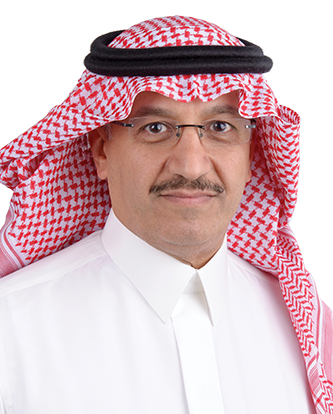Vice-chairman and CEO’s statement
YOUSEF ABDULLAH AL-BENYAN

VICE-CHAIRMAN AND CHIEF EXECUTIVE OFFICER
This year has been a very positive one for SABIC – a year when we began benefitting from our ongoing transformation into a company with an internal structure that is even better prepared to compete at the highest level in the chemicals industry. We have taken great strides toward our ambition of becoming the world’s preferred supplier of chemicals by continuing to embrace ‘Chemistry that Matters™’ to benefit of our customers.
Sustainability, which is a foundational element of our corporate strategy, has been crucial to this journey from a “Global Challenger” to a “Global Leader” – as reclassified by the Boston Consulting Group this year. Sustainability guides our allocation of resources to address global trends. Through it, we identify opportunities, reduce risks, inspire change, and improve resilience to a changing business climate. In addition, the increased transparency enabled by our sustainability reporting, which has been recognized by the World Business Council for Sustainable Development, makes us a more attractive investment in the opening Saudi stock exchange.
This year, the accelerated pace of change, disruptive technologies – those that completely change the industry landscape – and new digital solutions across the value chain continued to challenge traditional business models. Success in such an environment requires an agile structure and a focused product portfolio that can compete for global growth. SABIC’s shift from six Strategic Business Units in 2015 to only two in 2018 have helped us to adjust, but these internal changes must be supported by sustainability-driven innovation for improved processes and economic performance, reduced climate impacts, and faster product creation.
In an ever-changing global business environment, we were determined to ensure that we were allocating our resources to the appropriate areas, consistent with our 2025 strategy. We undertook a refresh of our materiality process to ensure that we focus on the risks and opportunities that are most important to our stakeholders and business success. We received inputs from internal and external stakeholders, who we considered our strategic priorities. We also engaged with external initiatives such as the United Nations’ Sustainable Development Goals and Saudi Vision 2030. Subsequently, we applied an evidence-based approach to determine the most relevant priorities for SABIC to tackle over the next five years. These priorities were resource efficiency, climate and energy, governance and integrity, circular economy, EHSS, and innovation and sustainability solutions. At the same time, we are continuing to make further improvements in key areas, such as social responsibility and supply chain.
In addition to the many downstream benefits SABIC brings to the economy – including employment, spread of global best practice, and business opportunities for supporting industries, to name a few – we strive for partnerships and engagement.
This year, SABIC was part of a Saudi Arabian delegation, led by the Ministry of Economy and Planning, to the High-level Political Forum (HLPF) on Sustainable Development at the UN headquarters in New York. We represented the Saudi private sector during the “Voluntary National Review” of Saudi Arabia’s sustainability efforts, as well as being one of the main participants in the “Energy in KSA” side event.
The circular economy – the idea that using renewables, conserving finite resources, and reducing waste by recycling, repurposing, and reusing materials is beneficial for both business and the environment – gained traction in 2018. Keeping plastics in the circular economy is desirable because it reduces resource demand and carbon emissions. Chemicals producers can benefit from the concept through innovation and design for circularity. I am happy to report that after studying this concept for years, SABIC is well-placed to lead in this field. We continued to progress this year through initiatives such moving toward a collaboration with Plastic Energy for a plant that will turn low-quality, mixed-plastic waste into valuable feedstock for our European operations.
We were also delighted to join the Alliance to End Plastic Waste, which is bringing the public and private sectors together to overcome this global challenge. Through prevention, clean-up, innovation, education, and communication, we will help to ensure that the environment is not negatively impacted by materials that bring enormous benefit to society.
Climate change continues to be a major concern for society. As a result, there is increasing pressure to reduce carbon impacts through sustainable manufacturing and material innovation. SABIC recognizes the fundamental importance of natural resources to our operations, and we constantly strive to become resource and energy efficient. This year, we approved our Renewable Energy Strategy to procure renewable energy as part of our energy mix, and we continued to progress toward our goals of reducing our greenhouse-gas, energy, and water intensities by 25 percent, and our material-loss intensity by 50 percent, from levels in 2010.
Central to our sustainability program – and at the heart of SABIC’s DNA – is environment, health, safety, and security (EHSS). Protecting our employees, contractors, customers, and communities is a core value that will never change. SABIC’s people are the fertile soil that will enable our organization to grow. This year, our SABIC Leadership Awareness Initiative enabled over 600 leaders from over 50 sites to undertake courses to strengthen their global leadership skills. And our new Employee Value Proposition will ensure that all employees are aware of the opportunities available to them to increase their skill sets.
Sustainability helps us to address many of the major challenges that lie ahead, such as strengthening our ability to raise capital as a transparent and trusted organization, improving our business resilience by accessing and addressing risks, and taking advantage of global trends through swift and decisive development of new products. In 2018, we made progress on these fronts and many others too. I would like to thank all of our stakeholders for their contributions and urge them to continue to this important work during the challenging times ahead.
